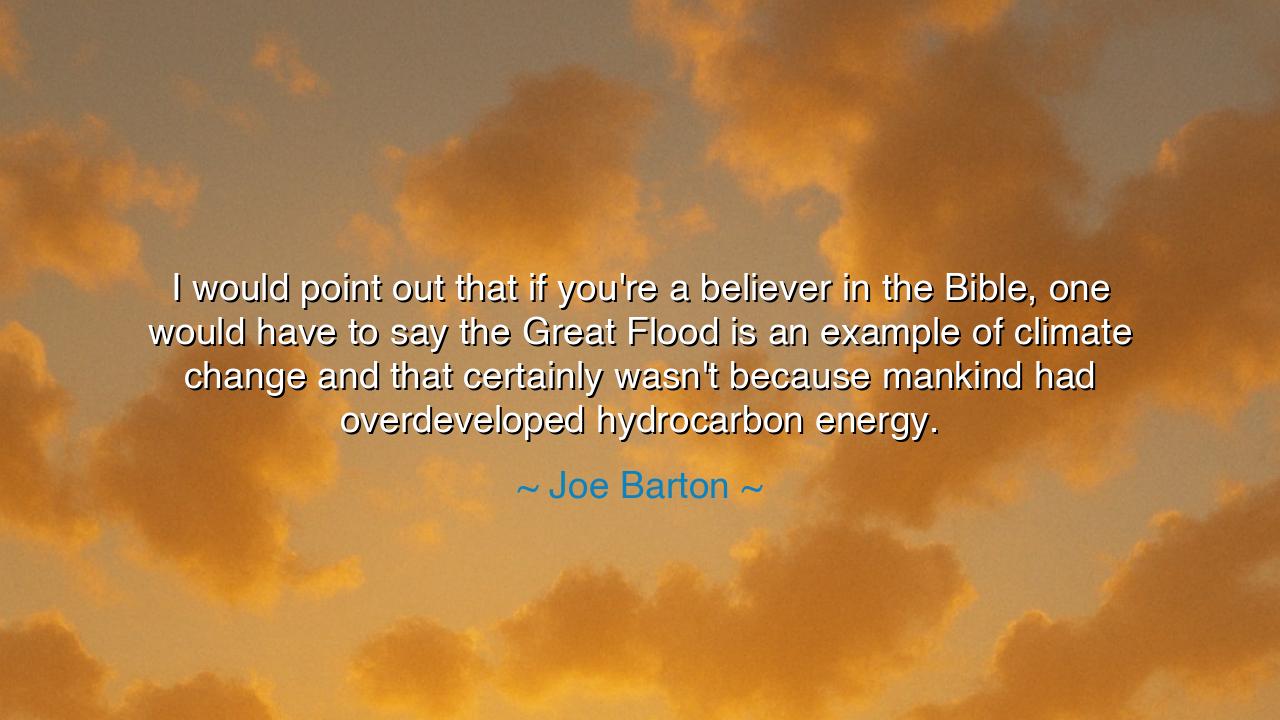
I would point out that if you're a believer in the Bible, one
I would point out that if you're a believer in the Bible, one would have to say the Great Flood is an example of climate change and that certainly wasn't because mankind had overdeveloped hydrocarbon energy.






In the cadence of old chronicles, Joe Barton offers a provocation robed as parable: “If you’re a believer in the Bible, one would have to say the Great Flood is an example of climate change, and that certainly wasn’t because mankind had overdeveloped hydrocarbon energy.” Hear the layers. He calls forth an ancient deluge to question a modern narrative, reminding us that waters have risen before the age of pipes and pistons. His saying does not deny storm or sea; it challenges causation and cautions against haste in blame. Beneath the rhetoric lies a simpler summons: keep memory long and reasoning careful.
The meaning of the oracle is double-edged. On one edge, it insists that climate has shifted across ages by powers larger than cities—tectonics, sun and shadow, ice and ocean, the slow breathing of the earth. On the other, it warns that our arguments about mankind and hydrocarbon energy must distinguish what is possible in principle from what is proven in fact. The sentence is a hedge against certainty too cheaply bought: not every flood is a verdict on industry, and not every storm is innocent of human touch. Wisdom keeps both doors open—mystery’s door and measurement’s door—and walks between them.
The origin of the saying flows from a culture that reads sacred text beside scientific report. The Bible’s Great Flood—echoed in the epics of Mesopotamia and the tales of many shores—stands as a mythic memory of catastrophe, moral and meteorological at once. Barton’s gesture harnesses that memory to the present quarrel, asking whether all modern “climate change” must be laid at the feet of smokestacks. It is the rhetoric of comparison: then and now, ark and algorithm, covenant bow and satellite arc.
Let us set a lamp by history. In 1931, the rivers of China swelled beyond living memory. Monsoon upon monsoon, snowmelt upon rain, the Yangtze and Huai broke their banks and carried sorrow across a continent. No vast fleet of cars had yet darkened the air there; no “overdeveloped hydrocarbon” machine explained the misery. Yet the floods were real, and their toll was unspeakable. The lesson is not that modern emissions are harmless; it is that calamity has many fathers—geography, governance, land-use, the weaving of weather—and humility requires us to count them all.
Another lamp: the Netherlands, cradled between water and wind. After the 1953 North Sea flood, the Dutch did not argue only about causes; they built the Delta Works, a cathedral of sluices and dams, and later they revised them, learning to “make room for the river.” Here is a wisdom older than polemic: whether the storm is ancient or modern in origin, a people’s duty is to know their ground, strengthen their gates, and design with the grain of the world. Practical stewardship does not wait for perfect apportionment of blame.
Thus the teaching: hold myth and model in honorable tension. The Great Flood can serve as moral mirror—warning against pride, urging preparedness—while instruments and records test how much of today’s warming and weather bears the fingerprint of mankind. Refuse the easy comfort of total denial, and the easy fervor of total dogma. Ask, instead: What do we know? How well? With what error bars? And what prudent acts would save lives and livelihoods under either story?
Actions, then, as plain as bread: fortify floodplains; restore wetlands that drink the surge; design cities with heat, wind, and water in mind; measure with honesty, publish with clarity, revise with courage. Diversify energy where it strengthens resilience; cut waste where it is folly; invest in early warning and local response. Teach children both the tale of the ark and the craft of the tide gate—so their imaginations honor the past while their hands secure the future.
In the end, Barton’s line is a reminder that argument should not outpace duty. Whether the tempest comes from ancient sky or modern smokestack, the charge remains: protect the vulnerable, learn the patterns, build wisely, and speak truly. Between scripture and sensor, between proverb and probe, let us be a people who do not drown in certainty, but who rise—calm, ready, and resolute—when the waters climb.






AAdministratorAdministrator
Welcome, honored guests. Please leave a comment, we will respond soon